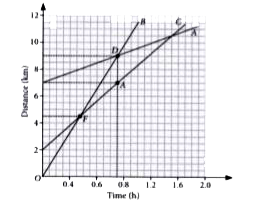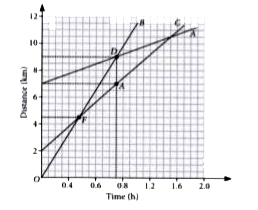Which of the following is true for displacement ?
(a) It cannot be zero.
(b) Its magnitude is greater than the distance travelled by the object.
Only A
Only B
Both A and B
None of these
The correct Answer is:D
Similar Questions
Knowledge Check
Can displacement be greater than distance?
AYesBNoCData insufficientD-Given figure shows the distance - time graph of three object A, B and C as time is taken on x- axis and distance is taken on y - axis . The slope of the distance - time graph of an object represents its speed .
The magnitude of displacement equal to the distance travelled by the object , then we can use the term uniform velocity in place of uniform speed

Which pair out of the three objects A, B and C travelled equal distance at any point ?AA and BBA and CCB and CDnone of theseWhich of the following has ΔS∘ greater than zero
ACaO+CO2(g)⇔CaCo3BNaCl(aq)⇔NaCl(s)CNaNO3(s)⇔Na+(aq)+NO−3(aq)DN2(g)+3H2(g)⇔2NH3(g)
For which of the following van't Hoff factor cannot be greater than unity ?
View SolutionFor which of the following van't Hoff factor cannot be greater than unity ?
View SolutionGiven figure shows the distance - time graph of three object A, B and C as time is taken on x- axis and distance is taken on y - axis . The slope of the distance - time graph of an object represents its speed .
The magnitude of displacement equal to the distance travelled by the object , then we can use the term uniform velocity in place of uniform speed

When B passes a distnace travelled by C is
View SolutionFor which of the following van't Hoff factor cannot be greater than unity?
View SolutionFor which of the following van't Hoff factor cannot be greater than unity ?
View Solution
